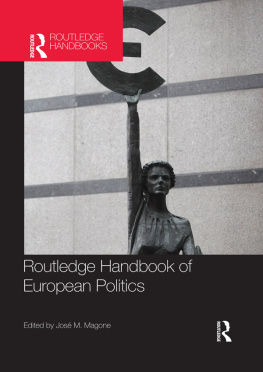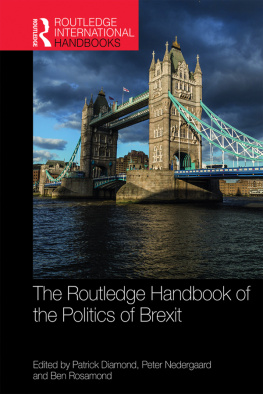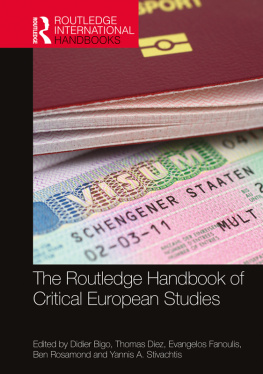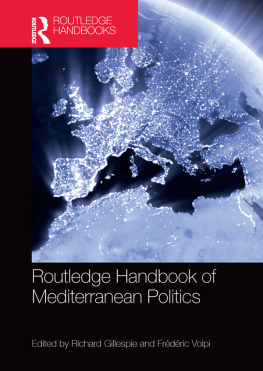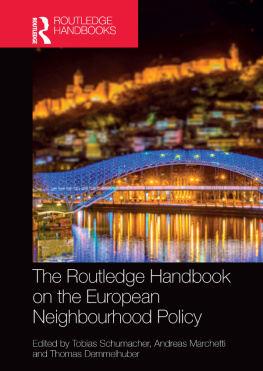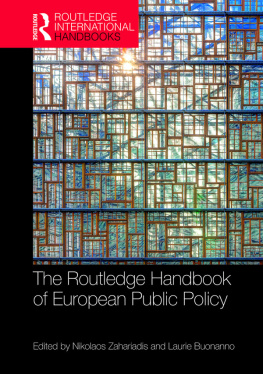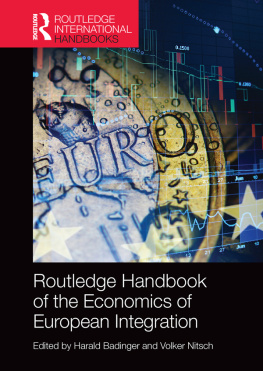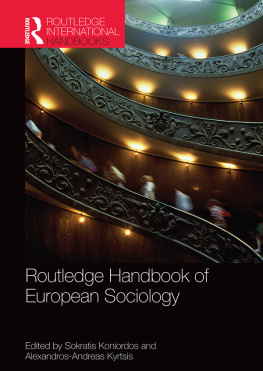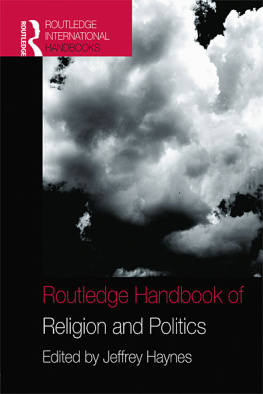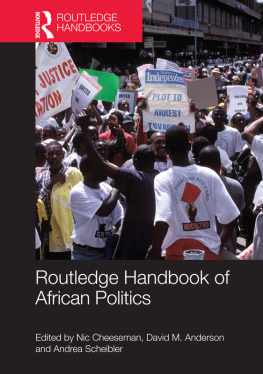Routledge Handbook of European Politics Rebvl - Routledge Handbook of European Politics
Here you can read online Routledge Handbook of European Politics Rebvl - Routledge Handbook of European Politics full text of the book (entire story) in english for free. Download pdf and epub, get meaning, cover and reviews about this ebook. publisher: Taylor and Francis, genre: Politics. Description of the work, (preface) as well as reviews are available. Best literature library LitArk.com created for fans of good reading and offers a wide selection of genres:
Romance novel
Science fiction
Adventure
Detective
Science
History
Home and family
Prose
Art
Politics
Computer
Non-fiction
Religion
Business
Children
Humor
Choose a favorite category and find really read worthwhile books. Enjoy immersion in the world of imagination, feel the emotions of the characters or learn something new for yourself, make an fascinating discovery.
- Book:Routledge Handbook of European Politics
- Author:
- Publisher:Taylor and Francis
- Genre:
- Rating:4 / 5
- Favourites:Add to favourites
- Your mark:
- 80
- 1
- 2
- 3
- 4
- 5
Routledge Handbook of European Politics: summary, description and annotation
We offer to read an annotation, description, summary or preface (depends on what the author of the book "Routledge Handbook of European Politics" wrote himself). If you haven't found the necessary information about the book — write in the comments, we will try to find it.
Routledge Handbook of European Politics — read online for free the complete book (whole text) full work
Below is the text of the book, divided by pages. System saving the place of the last page read, allows you to conveniently read the book "Routledge Handbook of European Politics" online for free, without having to search again every time where you left off. Put a bookmark, and you can go to the page where you finished reading at any time.
Font size:
Interval:
Bookmark:
The idea for this Handbook on European Politics came from Craig Fowlie, Global Editorial Director at Routledge. I have known Craig for almost two decades and he has been always quite supportive of projects that I have undertaken with Routledge. However, the Handbook on European Politics was his idea. He approached me to think about proposing a Handbook on European Politics at the World International Studies Conference (WISC) that took place in Oporto in August 2011. After some hesitation and discussion with Craig, I became enthusiastic about the idea and began to contact potential contributors for the volume. Craig and later Andrew Taylor, Senior Editor for British and European Politics, as well as Nicole Parkin, Peter Harris and Charlotte Endersbey, have been incredibly supportive throughout the project, such that it has turned out to be quite a pleasant venture over the past three years.
This Handbook of European Politics seeks to reflect the major changes that have taken place since the 1960s and 1970s in European politics. At the least, there have been the following major environmental and structural changes in European politics over the past 40 years:
- The complete democratization of the continent, apart from Belarus. After the democratization in Southern Europe in the 1970s, similar but even more complex transitions and consolidations of democracy took place in Central and Eastern Europe and in the Western Balkans. We no longer speak of a divided Europe, but rather a united continent that has been characterized as a regional community of democratic states (Laurence Whitehead) framed by the intergovernmental agreements of the Council of Europe and the supranational European law of the European Union. The fall of the Berlin Wall in 1989 is regarded in this Handbook as a critical turning point, or rather a juncture in European politics.
- The European Union has been a central agent in re-creating and moulding the relations between the vast majority of European countries. The EU has also been an important agent of democratization and Europeanization in Southern, Central and Eastern Europe. The Handbook on European Politics concentrates primarily on the 28 member states of the European Union. The Copenhagen criteria of 1993 the requirements of a functioning liberal democracy, a functioning liberal market economy, the ability to absorb the EUs 80,000 pages of legislation (the so-called acquis communautaire ), the respect for human rights and the protection of minorities have become core prerequisites for becoming a member, but also for retaining membership. The European Union has become an integrated multilevel governance political system incorporating regional, national, supranational and even in certain cases global levels.
- A third major feature of the new European politics since the 1970s is the change in the state and public administration architecture in relation to civil society and the private economic sector. Specifically, there has been a major shift from well-defined government ).
- A fourth major change is in the nature of politics. The major socio-political cleavages of European politics that were structured and encapsulated by traditional political parties, including the Christian Democrats, Social Democrats and Liberals, began to erode in the 1970s. Since then, the established historical parties have maintained their dominance in Western Europe, but their overall support has been declining. New challenger parties such as the Greens and extreme right-wing and left-wing parties have emerged, making national politics much more complex. European integration has also led to the emergence of Eurosceptic parties. In this Handbook, Ronald Ingleharts transition from materialist to postmaterialist values is applied to develop an understanding of this change within societies. Important in this regard is the critical assessment of how European liberalism can become repressive in relation to other forms of behaviour. Anti-immigration parties epitomize this trend towards repressive liberalism (see ).
- The fifth and final theme of the Handbook concerns Europe and the European Union in the world. One particular problem of the European integration process is that it has been functionally asymmetrical, also across countries. The Single European Market is still quite uneven and far from being a level playing field. Political, social and economic heterogeneity among the member states of the European Union prevents the establishment of a strong economic block. Potential further enlargement to the Western Balkans and Turkey would only increase such heterogeneity (see ).
The Handbook consists of 50 chapters that are organized in nine sections: theoretical and historical background; the political system and institutions of the European Union; national political systems and institutions; political elites in European politics; political parties and party systems; public administrations and patterns of policy-making in European politics; the political economy of Europe; civil society and political movements in European Politics; and Europe and the world. This volume represents a collective effort by a team of 62 excellent scholars and specialists in their individual fields of research. I took on the difficult task of coordinating the project, but all contributors went the extra mile to create a Handbook that is useful for the wider political science community, as well as for any reader interested in European politics. The work is intended to allow readers from all backgrounds to gain insight into a wide range of topics in European politics. However, this Handbook can only be a first step towards more specialized research. Many of the chapters are therefore accompanied by an extensive reference list; moreover, a collective commented bibliography for further reading can be found at the end of the Handbook. I have dedicated this Handbook to three great scholars of European politics who died in recent years and whom I had the great privilege to meet and speak with on a number of occasions: Irving Louis Horowitz, Juan J. Linz and Peter Mair. A Handbook of this dimension is large enough to accommodate all three of these giants in the field of political science.
The quality of language in this Handbook would not have been nearly as high without the flexible, hard work of Claire Bacher, who made insightful comments throughout the manuscript with proposals for the improvement of sentences and passages in each chapter. I would like to thank her very much for her meticulous attention to the language editing of the chapters before submission. She also went the extra mile to improve the overall language and consistency throughout the manuscript.
I take this opportunity to thank Craig Fowlie, Andrew Taylor, Nicola Parkin, Peter Harris and Charlotte Endersby for supporting me throughout the preparation and production of the manuscript. It s always a pleasure to work with the Routledge team. It was a pleasure to work closely with copy editor Lisa J. Williams and overall book project manager Olivia Marsh. Their kindness and professionalism contributed substantially to the quality of the Handbook.
Last but not least, I want to thank my mother for being so enthusiastic about the Handbook and awaiting its completion with such joy.
Jos M. Magone
Berlin, 7 February 2014
Europe and the world
Europeanization of national politics
Robert Ladrech
The politics of European integration were largely non-existent until the twenty-first century, outside isolated events in a few EU member states. The exceptions were countries that held referenda on EU issues, either because they were constitutionally required to do so (e.g. Denmark) or because they were motivated by domestic political reasons (the UK and France). In some of these cases (for example Denmark at the time of the referendum on the Maastricht Treaty or Sweden in 2003 on monetary union), the content of a treaty was the main focus of contestation; in other cases (such as France and the Netherlands in 2005), the referendum campaigns represented an opportunity for a variety of issues to come to the fore (Carbone 2010). In general, apart from the small number of referenda held over the decades, the European Union (as a political issue or a specific EU policy) rarely entered into the discourse of mainstream political parties in national or even in European Parliament campaigns. Therefore, pre-2000, the politics of the European Union more accurately described the nature of intergovernmental bargaining at the European level, whether over specific policies within the Council of Ministers (and later in its inter-institutional relationship with the European Parliament) or over more strategic questions of policy and integration initiatives in the European Council. However, by the turn of the twenty-first century, in many EU member states, the EU itself had become a politicized issue within domestic political arenas.
Font size:
Interval:
Bookmark:
Similar books «Routledge Handbook of European Politics»
Look at similar books to Routledge Handbook of European Politics. We have selected literature similar in name and meaning in the hope of providing readers with more options to find new, interesting, not yet read works.
Discussion, reviews of the book Routledge Handbook of European Politics and just readers' own opinions. Leave your comments, write what you think about the work, its meaning or the main characters. Specify what exactly you liked and what you didn't like, and why you think so.

